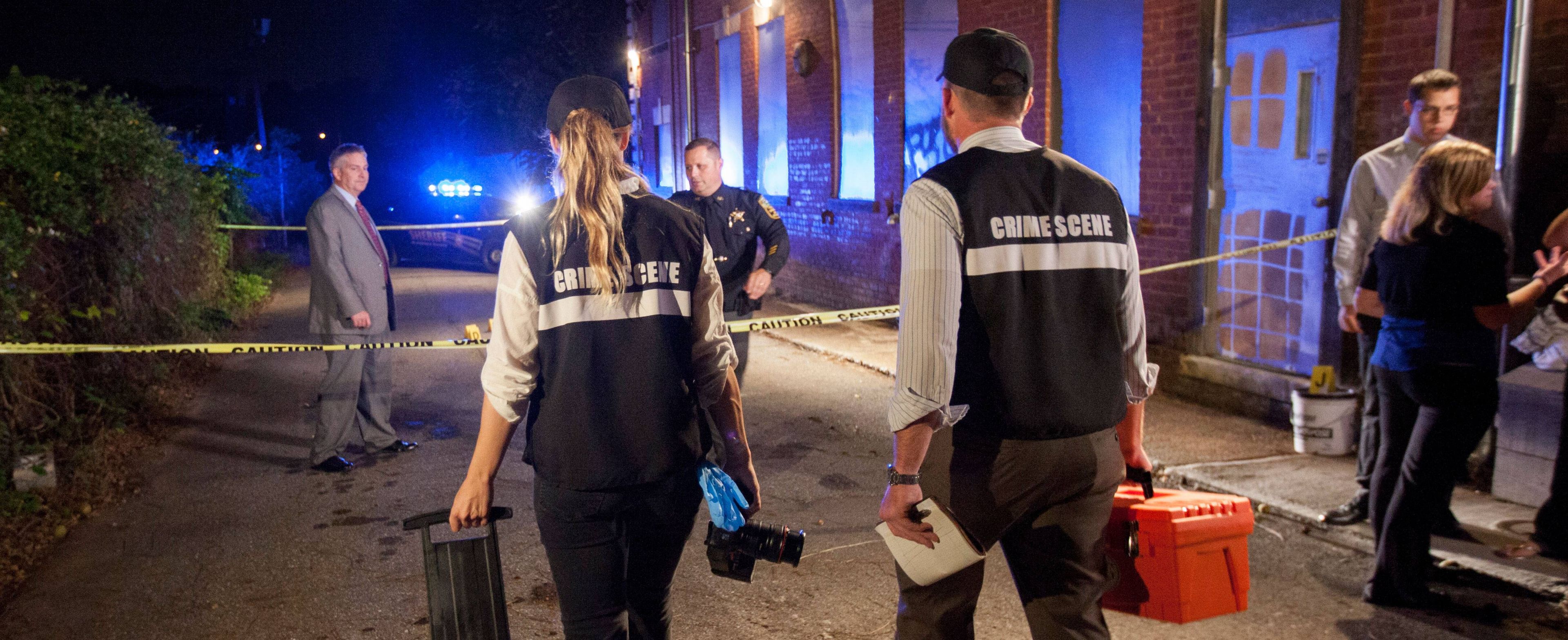Pursue a BS in Criminal Justice – Crime Scene Investigation Degree
A career in criminal justice often goes beyond what you see on TV and film. Your dedication to justice and sense of duty will be a welcome asset to your community and beyond as you serve in the capacity of a crime scene investigator.
Liberty University’s Bachelor of Science (BS) in Criminal Justice – Crime Scene Investigation degree can help you gain forensic skills and foundational knowledge for a career in criminal investigation. Throughout our criminal justice bachelor’s degree program, you can learn from experienced law enforcement officers who are passionate about teaching you the skills you need to serve your community and beyond with integrity and excellence.
The knowledge you receive in the classroom can turn into real-world experience as you’ll have the opportunity to participate in an exercise where you will process a realistic crime scene. You can have the chance to work alongside individuals from the Virginia State Police, Bedford County Sheriff’s Office, Campbell County Sheriff’s Office, and the FBI Crime Lab.
Award-Winning Campus
At Liberty, you’ll find an affordable, high-quality education that equips students like you for the real world. Our commitment to excellence helped us rank among Niche.com’s Top 3 college campuses in America. Earning your degree from a nonprofit university with state-of-the-art resources like ours can help set you apart from your peers.

Why Choose Liberty’s Bachelor’s Degree in Criminal Justice?
Our criminal justice program is an excellent program that emphasizes the hands-on experience you need to turn your coursework into useful skills that can be refined under the mentorship of your dedicated professors. Our professors come from a wide variety of criminal justice organizations at all levels of government. Their wealth of knowledge can help shape you into a professional law enforcement officer with the integrity and strength to be a leader in the workforce.
As one of the largest residential Christian colleges in the nation, we have the resources you need to make the most of your bachelor’s degree. With programs like our Washington Fellowship, you can gain hands-on experience through internships with organizations like the Metro Police Department without postponing your graduation date. Benefit from membership in Alpha Phi Sigma, the national criminal justice honor society. Gain opportunities for scholarship and career advancement as you connect with the criminal justice arena. Our Criminal Justice Club also hosts many events and learning opportunities for you to advance in a criminal justice career.
What Will You Learn in Our BS in Criminal Justice Degree – Crime Scene Investigation Program?
In our BS in Criminal Justice degree, you can learn important legal and procedural concepts, such as how to gather and process evidence. Gaining an accurate view of a crime scene is crucial for investigators so you can learn how to manage and photograph crime scenes. No proper crime scene investigation program would be complete without learning how to perform forensic computer and cyber analyses. You can learn how to conduct criminal investigations as well as participate in hands-on exercises along with other law enforcement professionals.
Download and review our BS in Criminal Justice – Crime Scene Investigation Degree Completion Plan.
Featured Courses
CJUS 361 – Crime Scene Photography
CJUS 362 – Crime Scene Management
CJUS 420 – Criminal Investigations
Highlights of Our Bachelor’s in Criminal Justice Degree Program
- We were awarded an Illuminate Grant for Justice Project DNA testing equipment and training, allowing students under the supervision of professors from our Criminal Justice, School of Law, and Biology departments to research cold cases and assist criminal justice reform advocates in exonerating wrongly convicted individuals.
- Our bachelor’s in criminal justice degree produces graduates of distinction who have interned with agencies such as the FBI, U.S. Secret Service, U.S. Marshals, Metropolitan Police Department, and NCIS. Our graduates have gained employment with the U.S. Department of Defense, Transportation Security Administration (TSA), AECOM Defense Services Sector, and the Virginia State Police.
- You can be taught by professors recognized for their excellence in teaching and who have served with the FBI, the Virginia Beach Police Department, and other distinguished law enforcement agencies.
- Our program is rooted in the practical application of the theories you learn through simulations within the classroom and internships in the field.
Our Criminal Justice Bachelor’s Degree Information
- Residential
- 120 total credit hours
- You may Transfer in up to 75% of your total degree.
- This bachelor’s degree program falls under our Helms School of Government.
- View our bachelor’s in criminal justice Degree Completion Plan.
- Find more information about our bachelor’s degree in criminal justice program in our course catalog.
Potential Career Opportunities for Our BS in Criminal Justice Graduates
- Computer forensics specialist
- Crime scene investigator
- Federal agent
- Police officer
Admission Requirements for Undergraduate Degrees
Every application is reviewed by the admission committee on a case-by-case basis, meaning there are no set minimums for acceptance. However, all applicants must submit the following documents* for admission:
- Admission application
- Official high school transcripts
- Official college transcripts (if applicable)
- Results from the CLT, SAT, or ACT are not required for admission, but may be used in consideration for merit-based aid.
- Admission essay
*Note that additional documentation may be requested by the admission committee after your application has been received.



